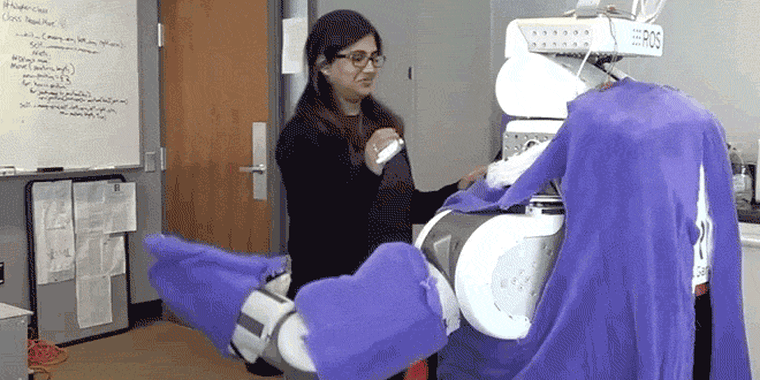These days robots do just about everything. They caffeinate us, assemble our furniture, and sort our recyclables. But can bots wrap us in their big metal arms and give us a squeeze that provides the same sense of comfort as a human hug?
Researchers are seeking to answer that question with help from “HuggieBot,” a humanoid robot programmed to offer hugs to humans. “We were interested in enabling robots to hug because of how common hugs are in daily life and because of their numerous health benefits,” said one of the researchers, Alexis Block, a Ph.D. student at the Max Planck Institute for Intelligent Systems in Stuttgart, Germany.
Studies have shown that hugs can reduce stress and blood pressure and can even help stave off symptoms of the common cold. In one 2015 study, researchers at Carnegie Mellon University in Pittsburgh observed 404 adults with colds and found fewer symptoms in those who received frequent hugs.
At a conference in Chicago last March, Block presented the results of a preliminary test in which HuggieBot gave each of 30 participants a dozen hugs — some short, some long, and some with an extra squeeze. The experiment was conducted at the University of Pennsylvania in Philadelphia, where Block studied before moving to the Planck Institute.
What happened? As you can see in the video below, some participants were a bit wary of Huggiebot, which stands almost as tall as a person and weighs about 450 pounds. But no one was crushed, and no one ran away screaming. Participants said they enjoyed the encounters, with some telling the researchers that Huggiebot seemed “nicer to hug” than they had anticipated.
Having shown that humans accept robot hugs, the researchers are now planning experiments with a new version of Huggiebot to measure how much emotional support the hugs provide. The scientists' ultimate goal is to demonstrate that robots are able to comfort people in settings ranging from college dormitories to senior living facilities.
“I think there is a demand for things that hug or mimic affective touch, so why not use a robot?” Tony Belpaeme, a professor of cognitive systems and robotics at Plymouth University in England, told NBC News MACH in an email. Belpaeme, who is unaffiliated with the current research, said he believes hugs from robots can provide emotional support.
But some experts have concerns about robots providing something that has always been provided by humans.
“The dangers of teaching a robot to hug may be that people become too emotionally connected to the robot and become dependent on it,” Cindy Bethel, director of the Social, Therapeutic, and Robotic Systems Lab at Mississippi State University in Starkville, told MACH in an email. “There is concern that robots may cause isolation if people become so attached to a robot, they may choose to not seek human companionship,” said Bethel, who was not part of the study.
Block said the goal wasn’t to replace human hugs but to supplement them. “We are advocating for this technology to be used as a complement to other people, in situations where it is difficult or uncomfortable to get the support a person needs or wants from another human,’ she said, “not as a substitute for human hugs.”

